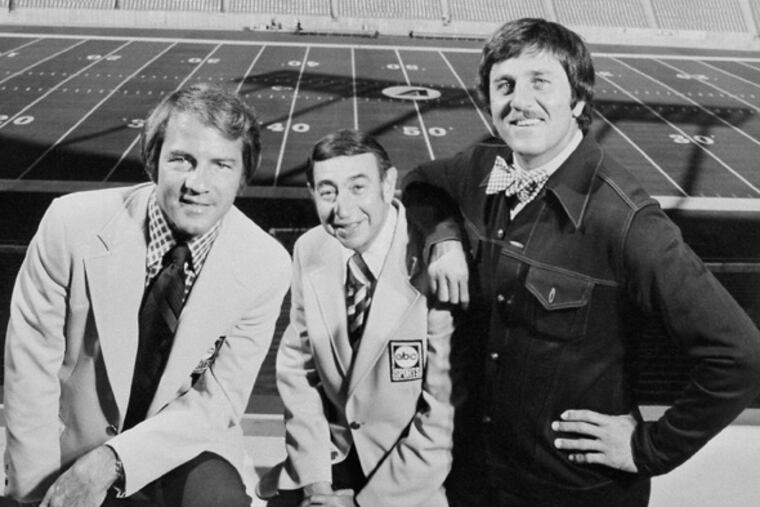'Monday Night Football' host Don Meredith dies
ALBUQUERQUE, N.M. - Don Meredith, the former Dallas Cowboys quarterback who served as a folksy foil for Howard Cosell on ABC's Monday Night Football and helped carve out the niche for colorful ex-athlete broadcasters, has died. "Dandy Don," as he was known, was 72.

ALBUQUERQUE, N.M. - Don Meredith, the former Dallas Cowboys quarterback who served as a folksy foil for Howard Cosell on ABC's
Monday Night Football
and helped carve out the niche for colorful ex-athlete broadcasters, has died. "Dandy Don," as he was known, was 72.
Mr. Meredith's wife, Susan, told the Associated Press her husband died Sunday in Santa Fe after suffering a brain hemorrhage and lapsing into a coma. She and her daughter were at Mr. Meredith's side when he died.
Mr. Meredith played for the Cowboys from 1960 to '68, becoming the starting quarterback in 1965.
While he never took the Cowboys to the Super Bowl, Mr. Meredith was one of the franchise's first stars. He led the Cowboys to three straight division titles and to consecutive NFL championship games in 1966 and 1967, where they lost both times to Green Bay.
"Don Meredith was one of the most colorful characters in NFL history. He was a star on the field who became an even bigger star on television," NFL commissioner Roger Goodell said. "He brought joy to football fans, from his play in historic NFL games like the Ice Bowl to his great personality that helped launch the success of Monday Night Football."
Over his nine-year career, Mr. Meredith threw for 17,199 yards and 111 touchdowns. He retired unexpectedly before the 1969 season and just two years later joined Keith Jackson and Cosell in the broadcast booth as part of the Monday Night Football crew.
He quickly became one of the most popular broadcasters in sports with a homespun humor that played off Cosell in particular. Mr. Meredith's signature call was singing the famous Willie Nelson song "Turn Out the Lights" when it appeared a game's outcome had been determined.
Mr. Meredith left ABC after the 1973 season for a three-year stint at NBC. He returned to the MNF crew in 1977 before retiring in 1984, one year after Cosell left the team.
In 1970, Mr. Meredith was in the booth for the St. Louis Cardinals' 38-0 whitewashing of his former team. The Cotton Bowl crowd late in the game began chanting "We want Meredith!"
Mr. Meredith quipped, "No way you're getting me down there."
Another famous Meredith moment occurred in 1972 at the Houston Astrodome. The Oakland Raiders were in the process of beating the Houston Oilers, 34-0. A cameraman had a shot of a disgruntled Oilers fan, who then made an obscene gesture.
Said Mr. Meredith: "He thinks they're No. 1 in the nation."
"Don Meredith was a Dallas Cowboys original. His wit, charm, and strength of personality were matched only by his wonderful leadership, toughness and athletic skill," Cowboys owner Jerry Jones said in a statement. "Throughout 50 years of history, the Cowboys' legacy has been built by dynamic and colorful personalities who could also compete at the highest level. No one fit that description better than Don Meredith."
Born April 10, 1938, Mr. Meredith was born and raised in Mount Vernon, Texas, about 100 miles east of Dallas.
Mr. Meredith was a three-year starter at quarterback for SMU and an all-America selection in 1958 and 1959. He was drafted in the third round by the Chicago Bears in 1960 and traded to the expansion Cowboys franchise for future draft picks.
Mr. Meredith shared time under center with Eddie LeBaron before winning the starting job in 1965 and the following year guided the Cowboys to their first winning season (10-3-1).
"Our offensive line was not very good early on," said Lee Roy Jordan, a former Cowboys linebacker. "He got beat up pretty bad - broken noses and collarbones and ribs, everything you can think of, Don had it. But he was one tough individual."